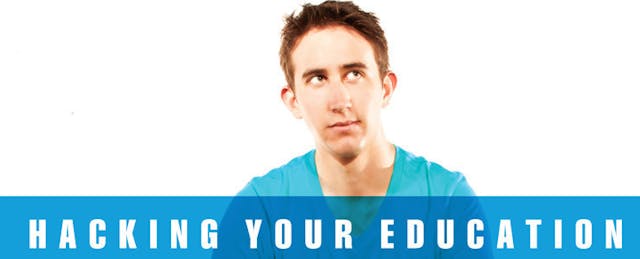As the old adage goes, it’s not what you know, it’s who you know. Start with yourself. That’s the central tenet of Hacking Your Education: Ditch the Lectures, Save Tens of Thousands, and Learn More Than Your Peers Ever Will by the young, charismatic UnCollege.org founder Dale J. Stephens.
As the title suggest, Stephens has written a DIY handbook for learning outside of the traditional confines of school. Over the years, Stephens has established himself as the face of the “unschooling” movement, where young students ditch the classroom in favor of acquiring skills and knowledge in the real world.
The appeal is certainly there, especially given the growing chorus of those questioning the value--if not the practicality--of a college degree. The dismal statistics have been often repeated in blaring headlines. The average college student currently graduates with $27,000 in debt. Fewer than half are currently fully employed.
“I am not arguing against school, I am writing in favor of choices,” Stephens writes. And the ones he’s made since dropping out of middle school appear to have served him well. At the age of 11, he started a photography business which he sold five years later. He spent six months largely on his own in France. After he returned to the US, Stephens worked as a product manager for edtech startup, Zinch (which has since been acquired by Chegg). He did all that before reaching the ripe age of 20--which is the age ceiling for his acceptance into the Thiel 20 Under 20 Fellows program. (Stephens became part of the inaugural class in 2011.)
Part self-help guide, part collection of anecdotal life stories, Hacking Your Education covers what it takes to develop the “hackademic” discipline and mindset, identify one’s own talents, and build a network of resources and mentors. The book kicks off with a series of mental and social exercises aimed at helping readers discover their passions, develop steely nerves and be ready to embrace risk. Some of the suggested challenges are fun, like organizing “brain parties” for esoteric discussions with friends over pizza. Others demand sheer guts. (“Go outside and ask the first person you meet, ‘Will you go on a date with me?’”)
There are many tips (or “hacks,” the word Stephens prefers) on how to be scrappy and resourceful. Can’t afford school? Duck into college classes anyway--professors are often quite happy to help out. Can’t afford that $7,500 TED Conference ticket? Why not apply to speak, or create some fake badges? Want to grab coffee with CEOs? You can probably guess their email address fairly easily--but be brief and concise. (As someone with a bloated inbox, I can vouch for this.)
Stephens also offers plenty of stories of fellow dropout friends from his extensive network. Many have founded successful startups. (Thankfully we are spared from the overplayed tales of Jobs, Gates and Zuckerberg.) Some have taken up senior positions at mainstream corporations such as American Apparel and Accenture. Still others are living the dream as DJs, film directors, and app developers working alongside renowned musicians like Bjork. Stephens even writes about those who have gone back to school to pursue graduate studies. And also on the list of distinguished dropouts are familiar faces in the edtech circuit, like Joi Ito, director of MIT Media Lab, and EdSurge friend and contributor, Frank Catalano.
One crucial “unschooling” prerequisite that the book seems to gloss over is the support, encouragement and trust from the parentals to let children take full control and responsibility for their education. Very often the decision to attend college is as much a familial decision--or made due to family or cultural pressure--as much as it is a personal one. UnCollege.org site has a letter from Stephen’s mom that shares the joys and challenges from being the parent of an unschooler. Perhaps Stephens’ parents might consider following up with a similar book aimed at this audience?
Unschooling may not be for everyone; it certainly has its critics. And there’s still a fine line between a dropout and a deadbeat. Stephens doesn’t share the starker stories of dropouts whose decisions haven’t panned out as well.
But what he has shown is how one can successfully separate the experience of learning from the schooling. And much along the lines of what the Thiel fellowship offers for college dropouts, Stephens will be leading his own UnCollege Gap Year Program, to begin in September 2013, that will take ten of the smartest unschoolers through a yearlong process of self-directed learning around the world.
“Having to learn while you do something as opposed to before you do something seems to be the biggest difference between the real world and school to me,” Stephens affirms.
And usually, people--employers included--find more interesting those who have the guts to try and fail.


